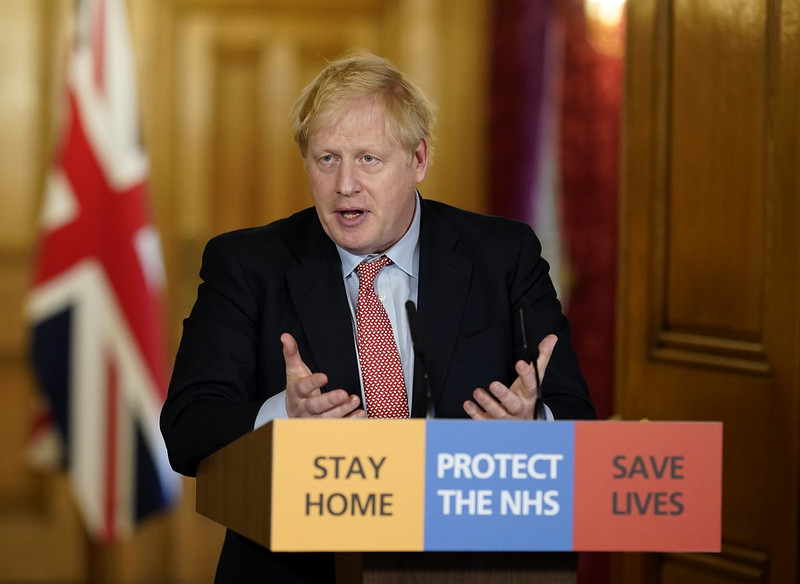Britain’s Coronavirus Response
Britain’s prime minister, Boris Johnson, has a new message: “Stay at home!”

Britain’s prime minister, Boris Johnson, has a new message: “Stay at home!”
Initially, Johnson took a fairly unorthodox approach to the coronavirus outbreak, calling on fellow Britons to “take it on the chin, take it all in one go and allow the disease, as it were, to move through the population.” The core epidemiological idea was that if enough people contracted the disease at once, it would create a kind of “herd immunity” that would ultimately stall its spread. But, after weeks of criticism that he didn’t take the coronavirus seriously enough, Johnson—who himself recently tested positive for the virus—announced stringent social restrictions on March 23.
In a televised address, the prime minister told the British people that they would be allowed to leave their homes only in four narrow circumstances: to shop for basic necessities, to engage in one form of exercise per day, to obtain medical care, and to travel to and from work—but only where traveling to work is “absolutely necessary and cannot be done from home.” The police, he continued, would have the powers to enforce these measures through fines and by dispersing gatherings.
To ensure compliance, the government told all shops that sell nonessential goods to close as well as other premises, such as libraries, playgrounds and places of worship. All public gatherings of more than two people (excluding persons you live with) and all social events (excluding funerals) were expressly prohibited. While noting that “no Prime Minister wants to enact measures like these,” Johnson emphasized that a national effort was essential to prevent the collapse of the National Health Service (NHS), the U.K.’s publicly funded health care system. Johnson concluded by saying that these new social restrictions would be made effective immediately and would last for three weeks, at which point the government would review them.
When he made this announcement, Johnson did not explain from where he derived the legal authority to impose these mandatory emergency measures, the likes of which Britain has not experienced since World War II. Nevertheless, three days later, the government formally codified its instructions in new coronavirus regulations issued pursuant to the Public Health (Control of Disease) Act 1984. Under normal circumstances, regulations issued pursuant to the act must be laid before Parliament for scrutiny. But in cases of emergency, the government can immediately issue the regulations, which happened in this case. Notwithstanding Johnson’s March 23 proclamation that new rules would be effective immediately, the coronavirus regulations formally came into effect on Thursday, March 26. They will last until Secretary of State Dominic Raab considers them no longer necessary—with an initial mandatory review scheduled for April 21. Emergency powers for Northern Ireland, Wales and Scotland arise from different legislation, such as the Public Health etc. (Scotland) Act 2008 and the Public Health Act (Northern Ireland) 1967. However, it’s anticipated that the policy of the four nations will be harmonized.
Coronavirus Regulations 2020
In keeping with Johnson’s instructions that people must stay at home, the new regulations enumerate the reasonable excuses to leave one’s home. They include the need to obtain basic necessities; to exercise; to seek medical assistance; to provide care or medical assistance; to donate blood; to attend a funeral; to fulfill legal obligations; to assess critical public services; to assist one’s child in transiting from one house to another; to move houses; to avoid injury or illness; and, in the case of worship leaders—but notably not lay congregants—to go to their place of worship.
As for gatherings, no more than two people may gather in public except when they’re members of the same house; it’s essential for work; they’re attending a funeral; and—where reasonably necessary—to move, to provide care or emergency assistance, and to participate in legal proceedings. The bill specifies which types of establishments must be closed during the emergency as well as 19 essential businesses that are permitted to remain open. While the latter list includes some obvious essentials—food retailers, banks, gas stations, police patrol stations and newsrooms—it also includes some surprising additions such as bicycle shops, dry cleaners and breweries.
To enforce its provisions, the bill empowers relevant persons—including police officers—to give a “prohibition notice,” effectively like a ticket, to anyone whom officers reasonably believe is carrying on business in violation of the regulation. If and when those businesses fail to comply with the prohibition notice, they may be subject to a fine. Where the relevant person believes that an individual is outside of their home in violation of the aforementioned regulations, the police officer may either direct that person home or remove them, using reasonable force if necessary. Those who venture outside of their homes in violation of the rules may also be fined.
Notably, the new regulations do not map entirely onto Johnson’s initial pronouncement and the government’s corresponding advisory. For example, the new regulations include additional bases to leave one’s home and phrase other bases differently. For example, while Johnson initially advised that individuals may only engage in “one form of exercise a day,” the new regulations do not impose a limit on the frequency, or mode, of exercise one engages in. Relatedly, the new regulations do not require that traveling to work be “absolutely necessary”—rather permitting it where it is “not reasonably possible” to work from home. These differences, though subtle, have led some human rights lawyers in the U.K. to worry that the police might misunderstand their real authority and act pursuant to the government advisory rather than the slightly more lax regulations.
Given the human rights implications of the new regulations, the U.K. Parliament’s Human Rights Committee has announced that it will seek to ensure the government’s approach is compliant with the U.K.’s obligations to certain liberties. Nonetheless, the committee has candidly acknowledged that “steps will need to be taken that interfere with human rights,” such as the right to liberty (enshrined in Article 5 of the European Convention on Human Rights) and the right to respect for family life (enshrined in Article 8).
Meanwhile, other countries have adopted even more extreme measures. For example, France now requires that people produce a document justifying why they’re outside and has imposed strict limits on the number of individuals who may attend funerals regardless of whether the attendees have the relevant documentation or the individual died from COVID-19, the respiratory disease caused by the novel coronavirus. Meanwhile, Israel has repurposed its counterterrorism technology to track the movements of those infected by the virus.
Coronavirus Bill
Following Johnson’s sober address on March 23, Parliament quickly adopted a 329-page coronavirus bill to enhance the government’s response. While the aforementioned regulations focus narrowly on social restrictions, the new bill enhances the government’s response in confronting and containing the virus. It does this in multiple ways.
First, it seeks to relieve the burden on British health care professionals by expanding the workforce available to assist. For example:
- It bolsters the registration powers of the Nursing and Midwifery Council, the Health Care Professions Council, and the Registrar of Social Workers to facilitate the speedy registrations of new (and retired) health care professionals. And it modifies NHS regulations to support the fast deployment of health care workers temporarily registered by the NHS.
- It authorizes a new compensation scheme to account for lost earnings incurred by a surge of volunteers and includes new powers to indemnify health care workers for clinical negligence connected to COVID-19 treatment. To encourage retired health workers to return to work, the bill suspends certain rules that apply in the NHS pension scheme to eliminate negative financial repercussions.
To complement these provisions, the government has been sending thousands of letters to retired British doctors and nurses since March 20, encouraging them to come back to work. So far, it appears to be working. On March 23, British Health Secretary Matt Hancock tweeted that, within 48 hours of sending government letters, “4,000 nurses and 500 doctors have signed up to return to the NHS.” And, on March 30, Boris announced from self-quarantine that 20,000 former NHS workers had come back to work.
Second, the bill relaxes the regulatory and legislative requirements applicable to frontline sectors.
- Currently, if a facility wishes to detain or release a patient facing mental health challenges from a hospital, it needs to get two doctors to sign off on the decision. Under the new bill, only one doctor’s signature will be required. It also permits the temporary extension or removal of certain time limits governing the detention and transfer of patients.
- Under the Care Act 2014, local authorities have an enhanced duty to assess the needs for continual care of vulnerable adults. The new bill would significantly reduce those duties, requiring local authorities to provide care and support only where failing to do so would be a breach of individual human rights.
- Further, the bill relaxes the reporting requirements in the case of death. For example, it permits doctors who may never have seen the deceased person to certify the cause of death and it loosens rules governing cremation.
- With respect to law enforcement, the bill relaxes procedures regarding the issuance of urgent warrants under the Investigatory Powers Act, a 2016 law governing Britain’s use of secret surveillance. For example, while the act originally permitted the ex post facto authorization of urgent warrants only within three days of the warrant’s issuance, that time frame has now been expanded to 12 days. The bill also amends existing legislation to enable individuals to participate in court proceedings through the use of video and audio equipment.
Third, the bill aims to contain the spread of the virus by expanding police powers to break up social gatherings and by enhancing sick pay.
- The bill streamlines existing legislation to empower the secretary of state to prohibit or restrict events and to close premises if such a restriction would help control the incidence or transmission of the coronavirus. The bill includes provisions to order the temporary closing of schools and ports, where necessary. And it postpones more than 300 local elections scheduled for May 2020 until May 2021.
- In February, the U.K. had adopted Health Protection Coronavirus Regulations pursuant to the Public Health (Control of Disease) Act 1984, which empowered public health officials, police officers and immigration officers in England to detain individuals where there was a reasonable grounds to believe that the individual has contracted the virus and is at risk of infecting others or, alternatively, that the individual has recently arrived from an infected area. The bill formally confers the same powers onto public health officers, police officers and immigration officers across the entire U.K. For example, where officials have reasonable suspicion to believe that a person has COVID-19 or has traveled from an infected area within 14 days, officials may require those “potentially infectious” persons to undergo screening and assessment. Those officials may also impose travel and activity restrictions on potentially infectious persons where necessary and proportionate.
- The bill also enhances statutorily required sick pay in two ways. First, it enables the secretary of state to issue regulations enabling employers to recover additional payments they made for COVID-19-related absences. And second, it allows the suspension of waiting days—that is, the initial days when an employee gets sick but does not yet qualify for sick leave.
By and large, the bill’s provisions apply across all three nations of the United Kingdom. (For a more detailed geographic breakdown of where each provision applies, see here.) While originally the bill was scheduled for parliamentary review, the government amended the bill to provide for review every six months—a concession to opposition leaders who wanted to minimize the risk of potential abuse. As Shami Chakrabarti, the shadow attorney general who is a member of the Labour Party, said: “Many of us would prefer even more frequent reviews, but given the particular challenges of this crisis, we are glad that the government seems to have moved some way towards the compromise offered by Labour in the constitutional and public interest.”
Human rights groups have expressed concern that the bill did not receive the scrutiny they felt it deserved. For example, groups like the British Institute of Human Rights worry that because the bill permits the “extension and removal of time limits in mental health legislations,” individuals suffering from mental health issues may be released into the community prematurely without the appropriate support or be detained for longer than necessary. In addition, by relaxing the obligations of local authorities under the Care Act 2004 to provide social care, some observers worry that local councils will shirk their responsibilities to provide support, particularly to disabled persons.
Rather than draft a 329-page bill for parliamentary approval, the British government could simply have issued regulations under the Civil Contingencies Act of 2004. The act is one of the world’s most powerful emergency statutes, though it has never been used. Indeed, it is the same statute that some observers worried Johnson was prepared to use to force a no deal Brexit. Under the act, the government can make emergency regulations where an emergency has occurred, is occurring, or is about to occur, and the regulations it intends to promulgate are both necessary and urgently needed.
Under the act, an “emergency” includes “(a) an event or situation which threatens serious damage to human welfare in the United Kingdom or in a Part or region”—the COVID-19 pandemic clearly satisfies this standard. When acting pursuant to a declared emergency, the range of available powers is considerably broad, including “any provision which the person making the regulations is satisfied is appropriate for the purpose of preventing, controlling or mitigating an aspect or effect of the emergency in respect of which the regulations are made.” For example, emergency regulations can, among other things, provide for the confiscation of property without compensation, prohibit movement to or from a specified place, and prohibit assemblies of certain kinds.
Why did the government opt not to use the Civil Contingencies Act? The most plausible explanation is that all regulations issued pursuant to that act expire after 30 days (assuming that Parliament approves them), whereas the Coronavirus Bill and its corresponding regulations will not. Another, perhaps less obvious explanation is that the Civil Contingencies Act specifically forbids the government from disrupting strikes—which, if Italy is any indication, could occur in the coming weeks as more businesses shut down. This exception would certainly undercut Johnson’s pledge to disperse social gatherings.
***
Over the past week, the rate of infection in Britain has escalated—doubling every two to three days—and ensnaring some of Britain’s most high-profile figures, including Prince Charles and Prime Minister Johnson. While British people have rallied around the NHS—with thousands leaning out their windows one night to clap for the staff—it remains to be seen whether Britain’s new emergency efforts, though extraordinary in scope, can satisfy an extraordinary moment. Or whether the government needs to take more extreme measures.





